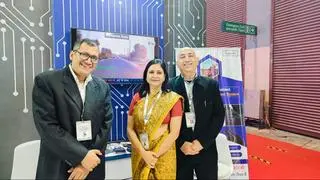While the pros and cons of Universal Basic Income (UBI) begin to get considered in some parts of the world, it’s worth noting that India has a tax regime that the salaried class, in particular, can take advantage of. IT regulations here allow for ‘tax savings’ on investments in approved instruments. This advantage isn’t far off from what UBI is aimed at, if disposable income and increased savings are the prime objectives.
But Bhavin Turakhia, CEO and Co-founder, Zeta, a Directi company, points to a challenge that needed solving in India: “Of the 40 million salaried professionals (government and private), only one million use tax saving instruments.”
Cracking it Disruption came first in the form of Zeta Meal Vouchers earlier this year. Turakhia had then declared he wanted to double the digital meal voucher market to ₹8,000 crore. He alluded to the company launching “other technology solutions that will change the face of commerce in India”.
Convinced that making distribution and claims of employee benefits paperless would be a significant opportunity for Zeta, Turakhia and his team went on to officially launch three more digital solutions early this month. According to the company, the new solutions will radically simplify how companies manage medical claims and reimbursements as well as incentives and reward programmes.
“We’re passionate about the potential to impact tax savings. If adoption is low, it’s because no company has made it easy for the HR departments or employees to avail themselves of the benefits,” says Turakhia, adding that even five million people using tax-saving instruments can mean about ₹16,000 crore of tax saved in India which, in turn, augments middleclass spending capacity.
No holding back With Zeta, the HR Manager is connected to every employee’s mobile phone – one click and he/she can transfer ‘grants’ of meal vouchers, medical reimbursements, gifts and other benefits to all employees, across cities. The grants are stored on an employee’s cloud-based Zeta account in the form of multiple virtual cards, each card representing a specific tax benefit.
Ramki Gaddipati, Co-founder and CTO, Zeta, says: “The Zeta system has been built to be intuitive and intelligent… We use machine learning and image processing technologies that help us achieve a reduction in time and cost of processing bill claims.” The Zeta app is loaded with offers from offline and online merchants that the company has partnered with.
Turakhia says over 200 clients across industries currently use its solutions. By this fiscal-end, Zeta wants to impact 2 lakh employees, which would translate to a “run rate of more than ₹1,000 crore”.








Comments
Comments have to be in English, and in full sentences. They cannot be abusive or personal. Please abide by our community guidelines for posting your comments.
We have migrated to a new commenting platform. If you are already a registered user of TheHindu Businessline and logged in, you may continue to engage with our articles. If you do not have an account please register and login to post comments. Users can access their older comments by logging into their accounts on Vuukle.